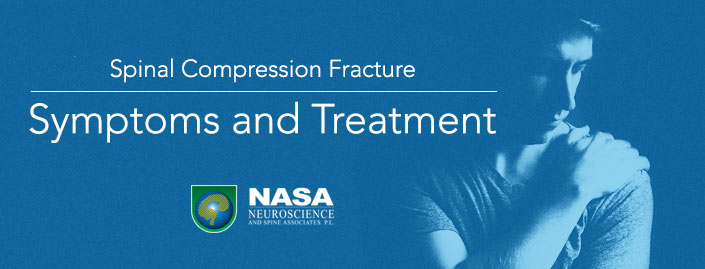Spinal Compression Fracture Symptoms and Treatment

Summarizing Spinal Compression Fractures
A Spinal Compression Fracture can occur when the bones of the spine crack, or fracture, due to pressure. Most spinal fractures are a result of the aging process, but they can occur at any age. They most often occur when bone mass is lost with age and the bones become more susceptible to compression fractures.
A compression fracture can happen throughout the spine but is most likely to occur in the middle or lower regions. It can result from a fall or lifting a heavy object. Because most fractures are a result of osteoporosis, which is a loss of bone mass, something as simple and uncontrollable as sneezing can cause a spinal compression fracture.
And because most of us won’t think that a sneeze can cause a spinal fracture it’s important to be aware of the symptoms.
Symptoms of a Spinal Compression Fracture
Untreated Spinal Compression Fractures Can Produce a Range of Symptoms, including:
- Unresolved back pain that becomes chronic pain
- Spinal deformities such as a hunched-forward position
- Loss of height
- Compression of internal organs
- Inability to perform daily tasks
- In some cases, no symptoms may occur
If you are suffering from back pain consult with your primary physician and ask them if your pain may be the result of a spinal compression fracture. Many patients are often misdiagnosed with general back pain or a muscle strain.
An MRI scan is required to determine the true cause of your back pain.
Treatment for Spinal Compression Fractures
Treatment will generally depend on the severity of the fracture and its effect on your ability to live your life. The three most common treatments include:
- Physical Therapy to build muscle strength and restore functionality.
- Medication is often prescribed to address the pain related to spinal compression fractures.
- Surgery may be required to treat fractures due to spinal compression. The most recent treatment advances include Kyphoplasty, which has proven successful in returning vertebrae to their original height.
—
Neuroscience & Spine Associates (NASA) is a patient focus multi-specialty group practice specializing in neurology, neurosurgery, and pain management. The experienced neurosurgery team of Neuroscience and Spine Associates can perform both your MRI scan and Kyphoplasty procedure. We have six convenient locations in Southwest Florida; four in Naples, one in Ft. Myers, and one in Immokalee.
